The Blessed Knights
An Excerpt from Bonacorso Fidelibus’s Work: The Many Wars of the Early 25th Century
Autumn, 2404
Early in the season the Sartosan pirates returned to their island haven, there to rest, repair, refit and recruit. Although one might think the pirates fully sated from their plundering of Alcente, their greed knew no bounds, and so Admiral Volker promised great riches to come, hoping thus to retain his command of the fleet. He was happy to receive news that the ransom for their prisoner, King Ferronso of Luccini, had been agreed and already part paid. Look, he said to his captains, the gold flows in even without the need to fight! Still, he was keen to ensure his captains had not the slightest reason to doubt his suitability, and so he raised the biggest force he had ever commanded, adding the infamous ogre Captain Kroll and his crew, and declared they would raid the richest realm on the coast of Tilea, Portomaggiore. He even claimed the fighting would be easy, as Lord Alessio had foolishly marched his realm’s army away to fight in the war against the vampires in the far north.
Lord Alessio Falconi was indeed many leagues from home and, due to the need to transport the magical colossus, was travelling much slower than others might. As his army, accompanied by the soldiers of the VMC who had fought with him at Miragliano, were crossing the bridge of Pontremola, he learned that Captain Mazallini’s mercenary company, the Compagnia del Sole, were a little way ahead (having fled from Campogrotta where the uomini ratto’s terror weapon had poisoned the land, including a swathe of the Tettoverde forest). Apparently, the mercenaries had already met with the Reman force outstripping the Portomaggiorans and VMC on the march southwards, and due to the difficulties presented by the need to forage for supplies in a barren land, there had been a bloody disagreement between them!
Despite the battered nature of all these armies, even open skirmishes between them, one of the VMC officers, Colonel Van Hal (commander of the ‘Meagre Company’) mentioned to the Portomaggioran Lord Marcus Portelli how potentially fortunate it was, just as a new force of uomini ratto were threatening Tilea, that the three battered armies now returning home (the Portomaggiorans, Remans and army of the VMC), should meet with the remnant of the once mighty Compagnia del Sole. For it had occurred to Van Hal that should these forces join, they could form by far largest army assembled in Tilea for over a century, sufficient perhaps to nip the surgent ratmen threat in the bud.
Alessio, an astute and able commander, could not help but ponder this notion, and (despite his need to return home to protect his realm from the Sartosan raiders, who had already ravaged the VMC controlled realm of Alcente) made enquiries of the other commanders concerning this fortuitous turn of events. Yet the VMC generalissima, Luccia La Fanciulla, regretfully answered that despite wanting very much to help, she had orders from her master to return south as soon as possible. And the Reman commander, a stubborn dwarf still smarting from the drowning of Captain Soldotovya and the dwarven warriors in the stinking waters of Miragliano, wanted nothing to do with the idea, saying he took orders only from the Reman arch-lector. Besides, he swore he would never serve in a force containing the Compagnia del Sole. Consequently, despite Captain Mazallini’s stated willingness (provided nothing was done contrary the dwarven King Jaldeog’s wishes) Lord Alessio gave up on the idea and continued his journey home.
Passing Remas he chose not to hire a fleet and travel the rest of the way by sea, again (perhaps) because of his urge to ensure the colossus was not lost, but this decision was one he was soon to regret, for in the last weeks of Autumn the Sartosans landed at Scalea, divided into two (still large) forces and set about thoroughly razing both Scalea and Eclano. The commander of the garrison army of the city of Portomaggiore, Lord Nero Accaiao, attempted to thwart them, but had insufficient forces for the task, and was forced to retreat back to the safety of the city walls having lost several regiments, including his dwarven mercenaries and their brave commander, Lord Girseak Irongrim. Thus it was, as winter began, the Sartosans’ mountain of plunder was so high that the vote regarding command or the fleet was won by Admiral Volker unanimously and loudly.
The realm of Portomaggiore was large enough that the loss of Scalea and Eclano was not a crippling blow, and the walled city itself contained not just the substantial remnant of the garrison army, but also a large standing force of militia soldiers (who had refused to march out of their home to assist at Eclano). And Lord Alessio was on his way home. And there was seasonal income and banked gold aplenty at Lord Nero’s disposal. Portomaggiore might be battered and bruised, but only in the way a dragon might be after its tail was bloodied, so that it remained very dangerous. What happened next depended on how bold Volker felt, how far away Lord Alessio was and whether the militia would act more bravely when it came to defending the walls of their home.
In the north-east, the mysterious elven denizens of Tettoverde Forest spied upon the uomini ratto in Campogrotta, and there were reports that an elven emissary had spoken to King Jaldeog of Karak Borgo, presumably to broker some sort of alliance between the two realms against the ratmen. By the end of Autumn, it appeared that the verminous army had left the city to disappear into their subterranean passages. Considering all the rumours and reports concerning the extent of these ancient underpasses and tunnels, many in Tilea became concerned.
…
Interlude: Fizzle-Crackle
Somewhere in Tilea

The new engine, which Gradger had seen fully assembled for the first time only the day before, was an unusual contraption, the like of which he had never previously encountered. He recognised several component parts, but their configuration and connections were strange. He struggled to see how it might be used as a weapon, despite the fact it bore several shards of sky-stone and vented the occasional fizzle-crackle.

Unlike several of the army’s war engines propelled by warpstone-heated steam, or the terror-bombard pushed by a modified steam-wheel, this relied on a more primitive power-source – several wretched slaves, encouraged in their endeavours by a lash wielding overseer. This was not what made it unique, however. It was everything else about it.

His friend, Farrgrin, meanwhile, was concerned about the proximity of the man-thing village. Gradger had attempted to assure him that it was entirely abandoned, most likely during the recent wars that wracked this part of the world.

“Good and better,” said Farrgrin. “For if the man-things have been fighting wars, then their armies are damaged-diminished, their strength sapped. But, see and know, Gradger, their houses have cellar-pits and roof-attics and other places to hide. Can you know for certain-sure all these were search-inspected?”

“Worry not. If there is someone lurk-hiding within, then why should we concern ourselves?” reassured Gradger, his voice as ever muffled by his mask. “While they skulk and scrabble in the small, dark places, then what can they do to us?”

“They might sneak out in the dark-night and go off to advertise our presence to all and sundry.”
Gradger shrugged his shoulders as if nothing could be done.
The chief engineer, who had ridden the engine earlier but was now walking by its side, was chatter-shouting commands up to the crew upon its platforms, apparently pointing out a course correction.

“Where is he taking us?” asked Farrgrin.
“For the present and now, he goes wheresoever the seer-lord command-orders, but when the time is right and good, the engine help show us the way, not its master. He will merely impart its understanding to the chieftain-commanders and Lord Urlak. Look see, Gradge, the engine is binnacle and compass, the engineer but the helm-tiller.”
“Then why and for what reason does he carry a perspective glass, if it is not he who should and must find the way?”
“That he might spy-see what lies ahead. The engine might suggest a route to travel, but I doubt it can know if a mountain rises, a river courses or a chasm lies in its path,” explained Gradger, despite being altogether uncertain about what the engine revealed.
“That may well be true, I understand and admit, but the machine is now assemble-constructed, its spokes turn-spinning and the master a-pointing and commanding. If we are going where Lord Urlak commands, then why is all that such and so?”
In truth Farrgrin’s discombobulation regarding the engine arose from the fact that he had become used to being the one who discovered such secrets, what with his message carrying and delivering, and the chance to hear the words of the senders and receivers of said messages. This time he had learned nothing, and so was forced to rely on his Gradger’s engineering knowledge. This made him feel considerably less important.

“The master and his mates must learn-practise,” said Gradger. “They must study the engine’s language, fathom its mysteries, comprehend its quirks, and master its movements both major and minute. If the engine speaks with a stutter, they need to know how to compensate. If it sometimes overspins, carried too far by the sheer speed of its revolutions, they must correct. Then when the time is right and needs must, their efforts will prove both acceptable and worthwhile.”
“And how do you know so much, when none and no others do, except the master and his crew?”
“I have been giving it much thought-consideration. Remember, friend Farrgrin, I am no mere ‘prentice scullion when it comes to engines.”
He had indeed spent much of the previous night pondering the engine’s purpose and how exactly it worked. Its uppermost assembly seemed to key to its function. A foremast-like shaft, itself reinforced with an iron shell, acted as the axle for a hub from which spokes projected, holding not the rim of a wheel but three exactly similar shards of sky-stone and an iron casting in the likeness of a lightning bolt.

The shards were not the purest quality, but they had been carved (a process which undoubtedly cost the lives of several labourers) to match each other in shape, size and presumably weight. At first, the lightning bolt made him think the engine was most likely a weapon, and indeed there was a fourth shard attached to a topgallant mast at the head of the axle, beside which an ether-coagulator was mounted rather like that found on the most common kind of warp-lightning cannon. But the iron pointer was merely a solid casting attached to a fourth, iron spoke, and thus very unlikely to channel a sufficiently controlled fulmination of warp energy to form a satisfactorily ranged bolt.
Perhaps this engine was more like a drill, or a saw, or a hammer? But these possibilities made little sense either, for nothing else about its form lent itself to such purposes. He had seen one of the engines that drills the exit tunnels from the underpasses, and if they were an iron chisel, then this flimsy contraption was a feather pen. It was not inconceivable that a well-placed hammer blow might shatter the entire engine. Besides the iron bolt was not connected in any way to the coagulator, neither by pipe, cable nor wire, and so, surely, it could only be what it appeared to be – a pointer!
Once he had a chance to observe the crew tending the fully operational engine that morning, now that they were not merely hauling the semi-dismantled engine as a clumsy burden through underpass, he could watch exactly what they were doing. He quickly perceived that they paid great attention to the subtle spinning of the shards and pointer, sometimes quick, other times slow; most often smooth but occasionally with a sudden juddering jerk, and it was obvious they were somehow reading its motions. But why they did so evaded him. Did it indicate the proximity of enemies, or allies? Could it reveal the approach of foul weather or the winds of magic? Did it show which direction a particular target lay? Or give warning the most dangerous or magical of foes?

He could not know. But it was obviously attuned to something, and clearly indicated a direction.
What really marked out this engine from all others he had seen was the pitiful prisoner, encaged in iron, hanging from its side.

This poor wretch, reduced to nothing more than flesh and bone (the latter quite visible through what little remained of the former) also had an ether-coagulator directed at him, and so perchance was a magic user of some kind, or in some way either powerfully blessed or cursed? But what could he possibly contribute to the workings of the engine? Was he as irrelevant as a mascot, or some sort of lucky charm? Or was whatever essence being drained from him crucial to the engine’s operation?

Having noticed Farrgrin’s repeated glances in the direction of the village, Gradger broke the silence, saying,
“I have been consider-thinking, and it seems to me that Seer Lord Urlak will want the manthings to know we are near and close. Urlak can use a terror weapon like the bombard but once to melt a city or annihilate an army, or instead he can more profitably employ it time and time again to scare-terrify the foe into retreat, or surrender, or convince them to pay a ransom so that they might live. If so, then the enemy needs to know the bombard is here.
Farrgrin hissed as if his friend had insulted him.
“What ails you and why?” asked Gradger.

“You told me that the bombard could not possibly work, yet here and now you call it terror weapon.”
“I can and do, for all and sundry know what the last of its kind did. It was a lesson to be learned by all our enemy-foes.”
“But you said everything and all about the new bombard was wrong, now here you change your mind, now claiming it can destroy cities after all. Why should I listen-believe when you tell me you know how this engine works?”
“I said only that it will show us the way,” explained Gradger. “I never claimed to know how.”
“So, Gradge. Tell and reveal – when Lord Urlak finally yields to this engine’s will, where will it take us?”
Farrgrin scowled, but not in an unfriendly manner, more an exhibition of his frustration.
“Friend Farrgrin, I have no idea!”

…………………………………………………………………….
An Excerpt from Bonacorso Fidelibus’s Work: The Many Wars of the Early 25th Century, continued
The Compagnia del Sole lodged first in Viadaza, where they met with the last survivors of the Brabanzon mercenaries and assisted in obtaining ships for them to return home to Bretonnia. By the end of Autumn, they had moved to Urbimo, invited by Barone Pietro Cybo. He had isolated himself in his palazzo since returning from the great defeat of the Disciplinati Di Morr a year previously, widely rumoured to be quite insane. Now, at last, he had emerged from his self-imprisonment to govern his realm once more.
In Remas the citizens welcomed their army back with open arms, the arch-lector blessing them for all they had done and rewarding all the officers among them with pensions and the soldiers with a year’s pay in advance, without demanding that they serve that year. A surprising number chose to remain in arms and took part in the grand parade to celebrate the great victory gained over the vampires. They gathered in the city’s Empire quarter – what with so many of them hailing from the north – before the taverna del Grifone Verde, there to cheer the knights parading throughout the city.

This new knightly order, the Cavalieri Benedetti, were being received into the Church of Morr’s service.

Each of them was a veteran of wars at home and abroad, some having already served as Cavalieri Addobbati or Cavalieri di Corredo, others having been members of knightly orders in the great ultramontane Empire (and occasional customers of the Green Griffon).

Now they had vowed to spend the rest of their days in service of Holy Morr, obeying his worldly representative, the arch lector’s, every command. Liveried like the palace guard in the colours of Remas, their standard bore the crossed keys to holy Morr’s garden.

Each knight bore some remnant insignia of their previous order, to reflect how all mortal souls, no matter whom they serve, as long as they are sufficiently worthy, will finally come to Morr’s garden.

This officially sanctioned order was just one of the ways that the Arch-Lector Bernado hoped to restore the high church’s traditional control of the city after the turmoil of both the wars and the rise of the Disciplinati di Morr.

The latter had not vanished completely, despite the complete annihilation of its army a year before, but his holiness ensured that it remained within its bounds, and functioned as just one of several religious orders, under strict supervision. As the Portomaggioran general Lord Alessio had proved, with a professional army of Remans, Portomaggiorans and VMC mercenaries, it was soldiers who could win wars against the undead, something even a huge rabble of dedicants and fanatics had found impossible.
In central Tilea, a new, uneasy peace had been achieved, or at least a tentative truce for the time being, between the antagonistic realms of Pavona and Verezzo. It was as if a moment in time had been stretched out, with each participating party willing it to continue, despite ongoing distrust and doubts of many kinds. As long as Duke Guidobaldo lay ill, his son would rule in his stead, and there were few in Tilea, even Pavona’s enemies, who did not have respect for the young noble, for all that he had done attempting to defend the realm from evil. While the uomini ratto presented a new danger to the whole realm, Barone Iacopo, the Verezzan regent, was glad to avoid war against the Pavonans (despite all that they had done). Meanwhile, he could enlarge his forces, so that whether he faced ratmen or Pavonans, when the time came he would be ready. His new alliance with Ridraffa (which had been instrumental in obtaining the truce) offered hope to both realms, as did the knowledge that Lord Alessio Falconi was returning from the north, for the barone had served in the alliance army commanded by Alessio, and not only respected him as an able commander but trusted him as a friend.
Boulderguts’ ogres had left Tilea entirely. The vampires and the rotting legions had been burned. Now it was Sartosan robbers and ratmen who presented threats, which (at least to those who knew their history) seemed somewhat less worrying, for neither were known for stability or longevity. The pirates had a habit of dispersing to the four corners of the world once they had sufficiently satisfied their lust for gold, while the uomini ratto had a propensity for chaos in many forms, from backstabbing and squabbling among their commanders to an over reliance on dubious strategies and unstable engines of war, and they were cursed with a streak of cowardice that could send them scuttling away at the first sign of possible defeat.
Could it be that once these two, last threats were overthrown, Tilea would enjoy a time of peace?
I Smell a Rat!
Campogrotta, Winter 2404-5
The last few years had been bad – the last few months the worst of all. When Wizard Lord Nicolo and Razger Boulderguts’ brutes had ruled the city, there were none who thought things could get worse. And indeed, they believed themselves tobe correct when General Bruno Mazallini of the Compagnia del Sole, contracted to the dwarven king Jaldeog, was made governor of the city. His may have been a military dictatorship, attained by right of conquest and in the service of a foreign power, but compared to the brute ogres, the people’s lives life were much closer to the old normality. Those who survived these two tyrannies (the greater and the lesser), to then become enslaved by the ratmen, learned the hard way that they had been wrong. Things could indeed get much worse.
Those still alive now, less than a third of the populace that had dwelt in the realm before the wizard lord’s return, were left reeling, each in their own way, from their experiences at the ratmen’s hands. Some had been made tough by their long sufferance – becoming grim and silent types. Others had been wounded, in either their bodies, minds, or both. Those who survived the whippings and beatings, wore scarred flesh. Those who had almost starved to death, had sunken cheeks and darkly shadowed eyes. Those who had been cruelly toyed with, suffering the ogres’ mocking and threats, or the ratmen’s tortures, or had witnessed deadly harm done to those they loved, bore battered minds, which made them strange to others – becoming either shadows of their past selves, or gibbering, frantic fools.
Yet there were some who emerged from the recurring nightmares glad to be alive – indeed, almost giddy about the chance to begin afresh. Their saviours, the mysterious ‘Brotherhood of Shadows’, the Arrabbiati (Angry Ones) could have been the servants of the worst tyrant prince ever to have ruled a city state in Tilea, and they would have been an improvement on the ogres and rats. They could have reinstated the same sort of rule that the dwarf king had foist upon the city, with a condottieri governor failing to understand their simplest needs, and the people would have been glad. Instead, however, and against all expectations (except for those who knew the old stories and the truths contained in them) the mounted brigands were like paladins of the poor! They seemed only to want the peoples’ freedom from oppression, and indeed encouraged the Campogrottans to make their own government, a ‘Republic Commune’ like those of old, before the nobility bound the whole of Tilea into their service, demanding obeisance and taxes.

Three survivors, inspired by the new hope, had happily volunteered to assist in one of the first, if very unpleasant, tasks required for Campogrotta’s rebirth. It was a task which required spades.
“Someone must’ve helped the riders into the city,” said Amilcare, as they strolled easily down the Via Sarpi. “More than one, I reckon, ‘cos they came in through two, maybe three of the gates. That’s how they appeared in so many streets so quickly.”

His head was hooded, the better the fend off the winter’s cold, and he carried his spade upon his shoulder, as if it were a pike. He served in the militia in his youth, and had been tempted to leave the city with those ogres sent to join the arch-lector Calictus’s Holy Army in the war against the vampires. But for the sake of friends and family, he had stayed. It was a decision he had secretly regretted many a time since.
“Probably died doing so,” he continued. “Because no-one claimed has claimed to honour, nor does anyone know who did it.”
“I don’t think you’re right, Ami,” said Celso. “Who could have done it? The rats sniffed out everyone – had us all chained or watched. There were none left free in the city at all. It must’ve been some of the Arrabbiati, sneaking over the walls in the dark. They are masters of the shadows.”

Gilda, who had volunteered for the digging first, thereby shaming the two men into doing the same, sniffed, as she often did when about to speak her own mind.

“I know one of the riders grew up here,” she said. “My neighbour’s nephew, he is, who fled when accused of stealing a piglet. He would know where to climb, which gate to open, and how. Him, and any others who once lived here.”
“Aye. You’ll be right,” agreed Celso. “Plenty left when the wizard lord came with his ogres. Reckon a good few of them crept into the wilderness to join the Brotherhood, maybe even went to join their brothers or friends already outlawed.”
“You saw them, didn’t you Gilda?” asked Amilcare. “You saw the riders fighting?”
“I did that, out near the western gate. We had been shifting barrels from the Archer’s Rest, with two rats guarding us. All of a sudden, a bunch of rats came pelting down the street, shouting at the two with us, who scurried after them. Then came the riders, making no sound but that of their mounts’ hooves on the dirt, with a banner at their front.

“The rats stopped and turned near the wall, and a couple came running out of the tower onto the battlement above.

“The riders loosed arrows, killing one of the two who had been with us, before he even got to the others, and another on the wall.

“Then they kept on a-riding, off down the street, not slowing at all, like it were a race, while more and more came up behind to loose their arrows. The rats just cowered there, shields up, looking at their dead, and flinching as the riders galloped by.”

“Cowards, every one of them. Like all bullies,” said Celso. “I saw the fighting too. I got loose when the alarm was first raised. The rats guarding us were so panicked at the sound of it, that they didn’t even chase us. I ran towards the sound of the bell, thinking to help whatever or whoever it was causing trouble, whether it be flames or escaped prisoners. Didn’t expect to see riders, but I turned a corner and there they were!

“Like Gilda saw, they had cornered a bunch of rats, who had nary a pistol nor bow among them. The riders were laughing as one of the vermin ran ragged towards the others.

“I think they’d already struck him with a blade, for he made hard work of the journey, and his squeals filled the square with ugly echoes. One rider had an arrow knocked but another was shouting ‘Wait!’ Which the archer did …

… so that he could put the arrow in the running rat just as he stepped close to the others. After that, the other riders all started shooting, and the squealing got considerable louder!”
“I saw none of it,” said Amilcare. “And if Marianna hadn’t brought some riders down to smash through the lock of the door, I’d still be down in that cellar now I reckon.”
“I told you she had an eye for you,” said Gilda.
Amilcare was not sure if she was joking cruelly, or just had not thought about the words she used. Marianna had only one eye, ever since a rat gouged the other out with a clawed finger when she made the mistake of looking at him the wrong way. Amilcare said nothing, however, for there was no hint of mischief on Gilda’s face.
Suddenly they found their first corpse, lying in the street smeared in blood, presumably its own. If it were not for the winter’s cold, they would likely have smelled it before that saw it.

“Right,” said Celso. “Here’s the first. Where are we gonna put it?”
“I know that one. He was nasty,” said Amilcare.
Gilda laughed. “Doesn’t narrow it down much, considering they were all nasty.”
“He was one of their captains,” continued Amilcare. “And he always found a way to make any task more unpleasant. I saw him cut a man’s finger off before we started labouring on some stones, just so he could nibble on it while the work was done.”

“You want to cut off its finger?” asked Gilda.
“Aye, that and more, for what he did. But only if he were alive. No point to it now.”
“Still gotta decide what to do with the creature,” said Celso.
Gilda prodded the corpse tentatively with her shovel’s blade. “Can’t we bury it here, so we don’t have to drag it around?”
“In the street? That ain’t right,” declared Amilcare.

“We don’t have to give the likes of them proper burials,” said Gilda. “Doubt they’d do it for each other. Its own kin would have eaten it and talked only of how chewy the flesh was. They’re all no better than sewer rats.”
“No,” said Amilcare. “It ain’t that. I don’t care about him at all, but those who will live here after. Who wants his kind buried before their door?”
“Or his ghost a’screeching when both moons are full?” said Celso.

“So, we move him. Where to?””
“Maybe burn him?” suggested Amilcare.
“And hope the smoke doesn’t come your way as he burns?” said Gilda, regretting the smell she had stirred when she prodded the corpse. “I say stick it under a midden heap, so the smell hides the stench as it rots.”
“Did the riders not say what to do with them? Is there a pit for them all to go in? Like a plague pit?” asked Celso.
“They said nothing, other than we might want to clean the streets of them.”
“Not helpful,” Celso complained.

“Well, we’re in charge, see?” said Gilda. “The riders saved us, but they’re not conquerors. It’s up to us to decide the this and that’s.”
“I’ll believe that when I see it,” said Amilcare, although inwardly he liked the sound of the people being in charge of things. He just wished it was deciding something other than what to do with a dead rat!
“Well,” he said, “I’ve no wish to promote myself to head gravedigger in our new republic, but I say we choose a spot, dig a big pit, and drag all the rats we find to that same pit. Throw ‘em in, shovel a layer of lime atop them and then we’re done. That way we only have to dig one hole. Easier that way.”
“Easier aye!” agreed Celso. “But it’ll have to be a big hole. So, we need more volunteers, and please, let’s get barrows and carts for the shifting, eh?”
“Very good suggestions,” said Amilcare. “I should make you chief assistant to the head gravedigger.”
Gilda grinned. “Then I shall become Overseer of the Graveyards and give orders to the both of you!”
Broad Pieces of Gold
Eclano, Portomaggiore. Winter, 2404-5.
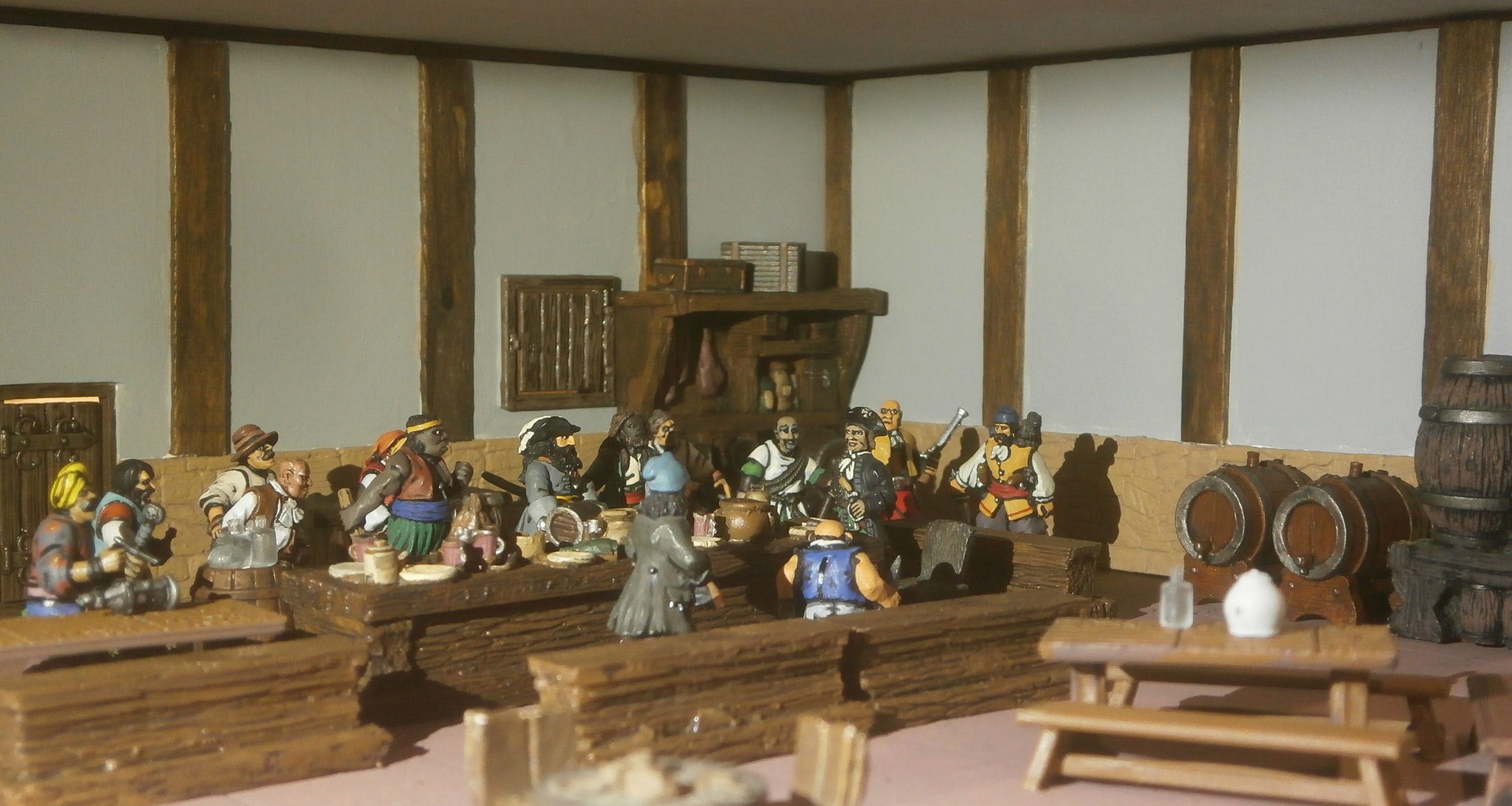
Leopold Volker, Admiral of the Sartosan fleet, had gathered sufficient captains and mates to constitute a quorum. They had arrived in dribs and drabs over the last hour, each newcomer joining the feasting and drinking, until the sorcerer Adus Arcabar at last indicated to Volker that the required number was reached, at which moment the Admiral coughed loudly, and gestured that the company should all stand (this being the practice to show that a council, not a carousing, was in session.)
“Welcome all,” said Volker. “Let us praise Manaan and give thanks that our ventures so far have proved most satisfactory and prosperous.”
A cheer of ‘Aye!’ went up, and those present drank the last of whatever was in their tankards, bottles and goblets, then slammed them down upon the table. Three loud burps followed, strangely tuneful in arrangement, but this elicited not even a snigger, for it was entirely expected.
Volker gave a smile that somehow failed to contain even a trace of contentment, and continued his address,
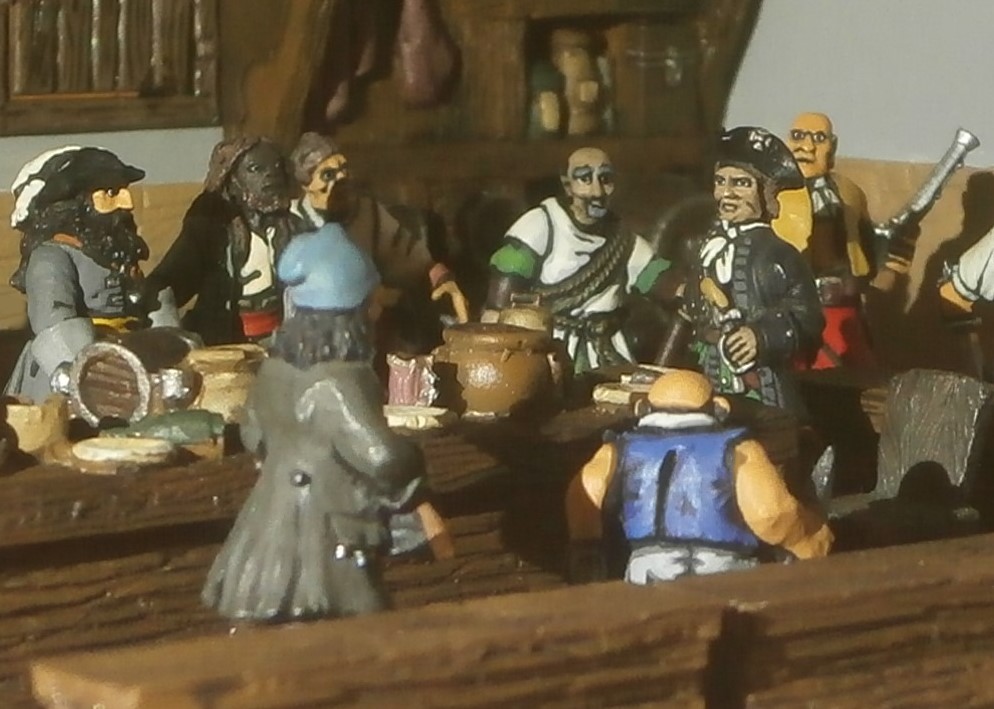
“As you all know, we received word, four days since, that the city’s governor, Lord Nero, would promise to pay a bribe of 50,000 in broad pieces of gold if we were to leave the realm of Portomaggiore immediately, inflicting no more harm, nor stealing anything else. Furthermore, he guaranteed us safe passage, and that his lord and master, Duke Alessio, neither through his fleet nor army, would commit any hostile act against us, wheresoever we be abroad, for no less than a year. The gold is to be paid by the respected banking house Posillico e Crognale, by way of a guaranteed ‘promissory’ note, redeemable for the sum in full this next Winter Solstice, at a place of our choosing.”
“Fighting is good. Gold is better!” interrupted Captain Van Baas’s first mate, Moukib Brahimi, his fist clenching as if accepting a dose of coins.
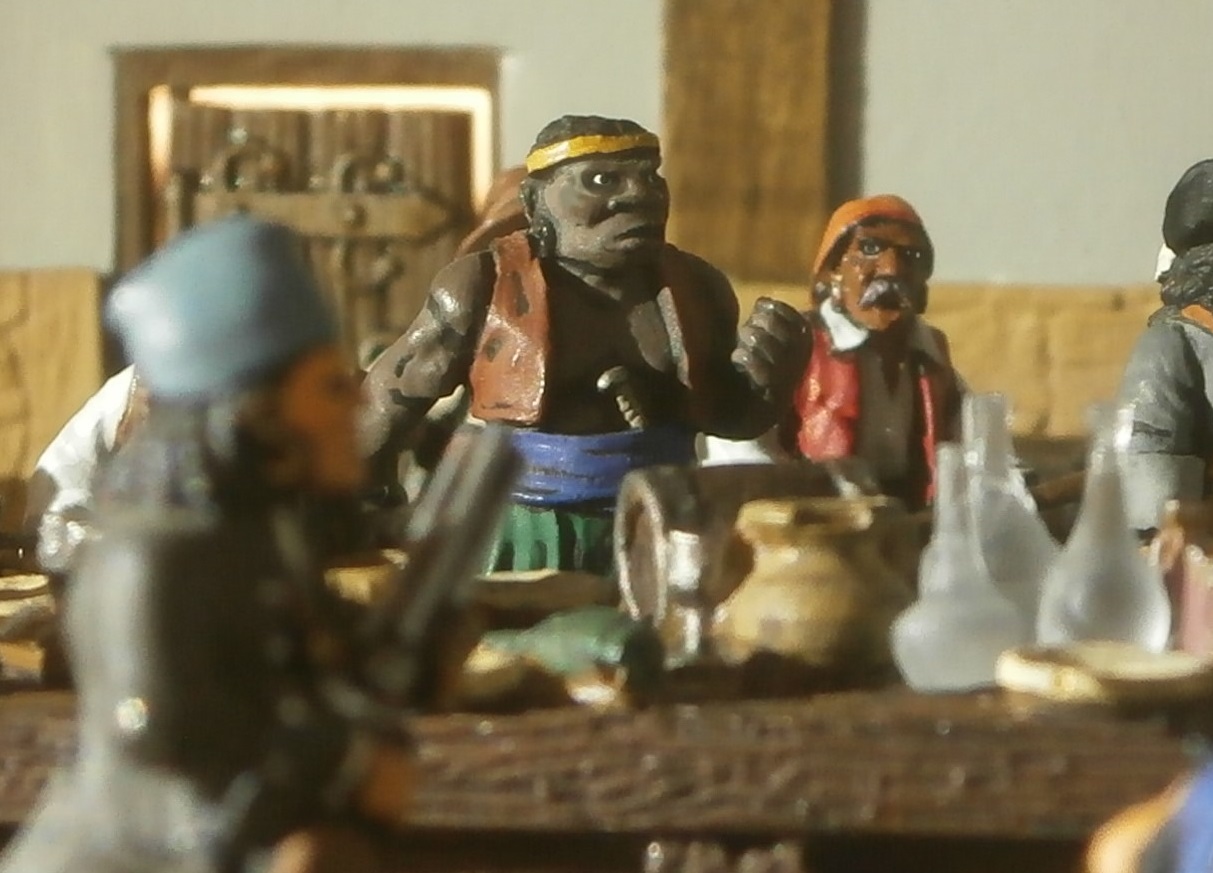
“You all know too,” continued Volker, “that we sent Gerino and Hassim to barter, for why agree hastily, when we might get more by haggling? As you can see, they have returned.”
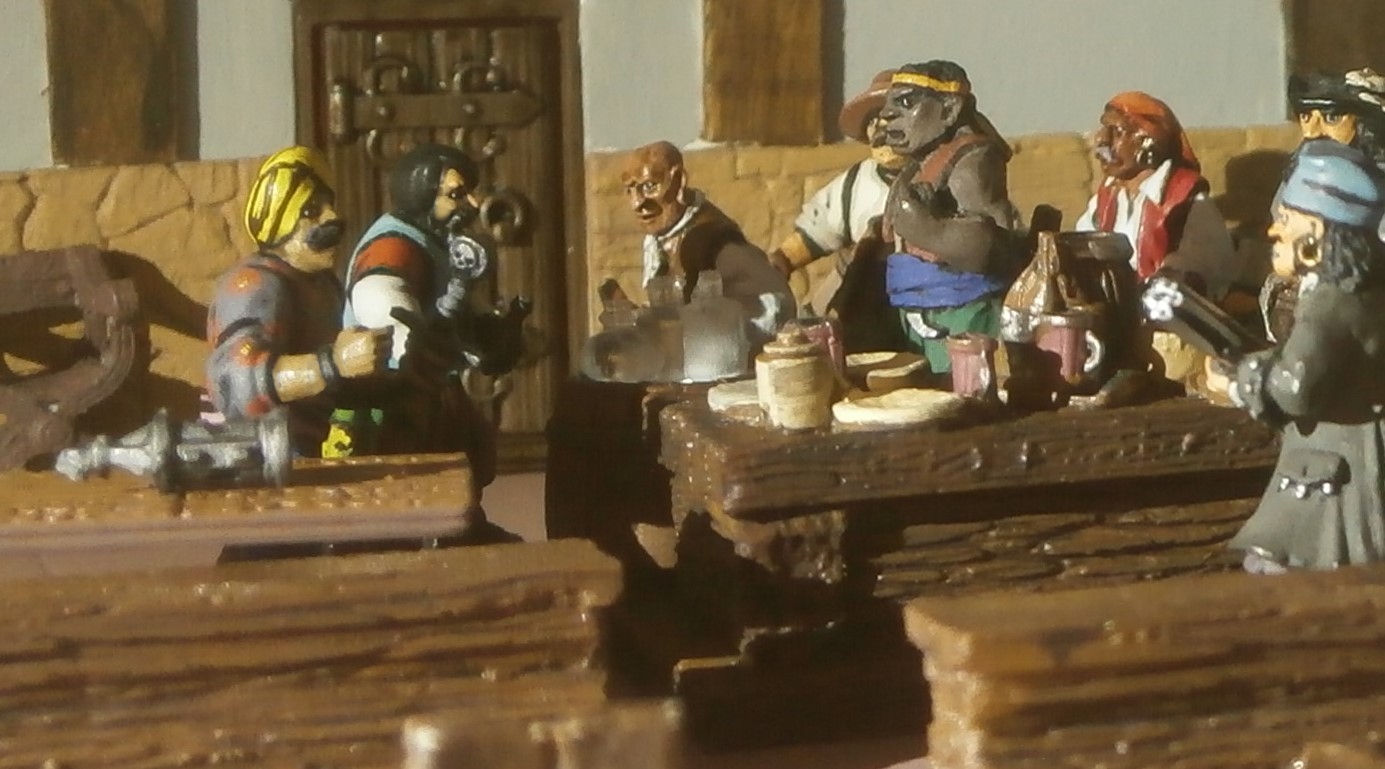
The two pirates in question, Gerino with his mop of jet-black hair and Volker’s quartermaster Hassim sporting a yellow turban, looked momentarily nervous as the company turned to study them.
“I have no doubt,” said Volker, “that you will all be keen to hear what they have to report.” The strange non-smile returned as he stared at the two of them. “Gentlemen?”
It was Hassim who spoke.
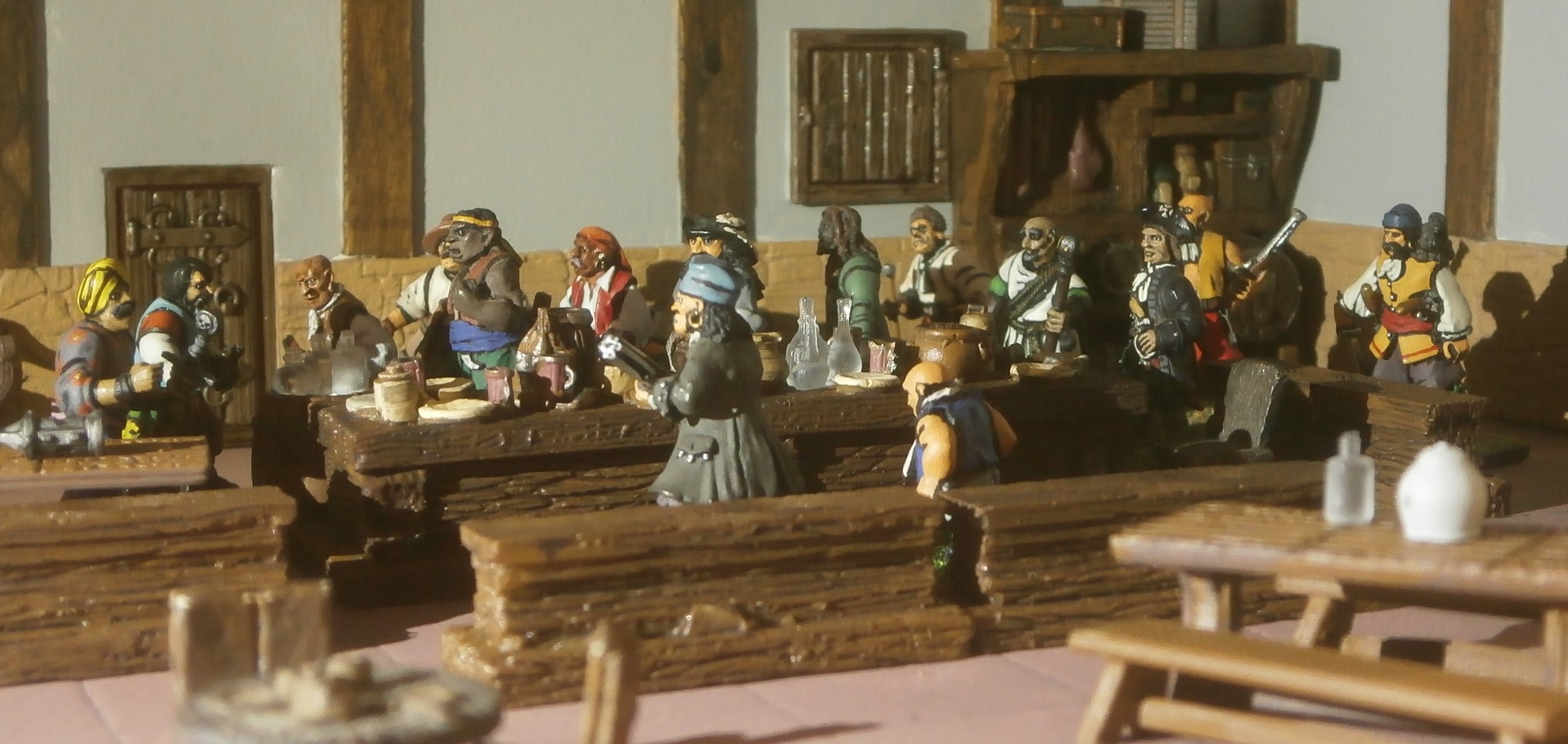
“We met this Nero, yes. His anger was obvious, and I think fear also, despite his attempt to conceal both behind his haughty manner. As ordered, we told him that you, admiral, would agree to his offer, to the full, yes, and begin leaving immediately, if he were to pay 75,000 – that is, 25,000 immediately and 50,000 more as per the promissory note agreement. It was clear he was not, how can I say … keen on the demand for more.”
“Then?” enquired Volker.
“Put plain, he refused to alter the terms one jot. I think it likely he had orders from Lord Alessio and was loathe to disobey his master.”

“Perhaps he is just stubborn?” suggested the admiral.
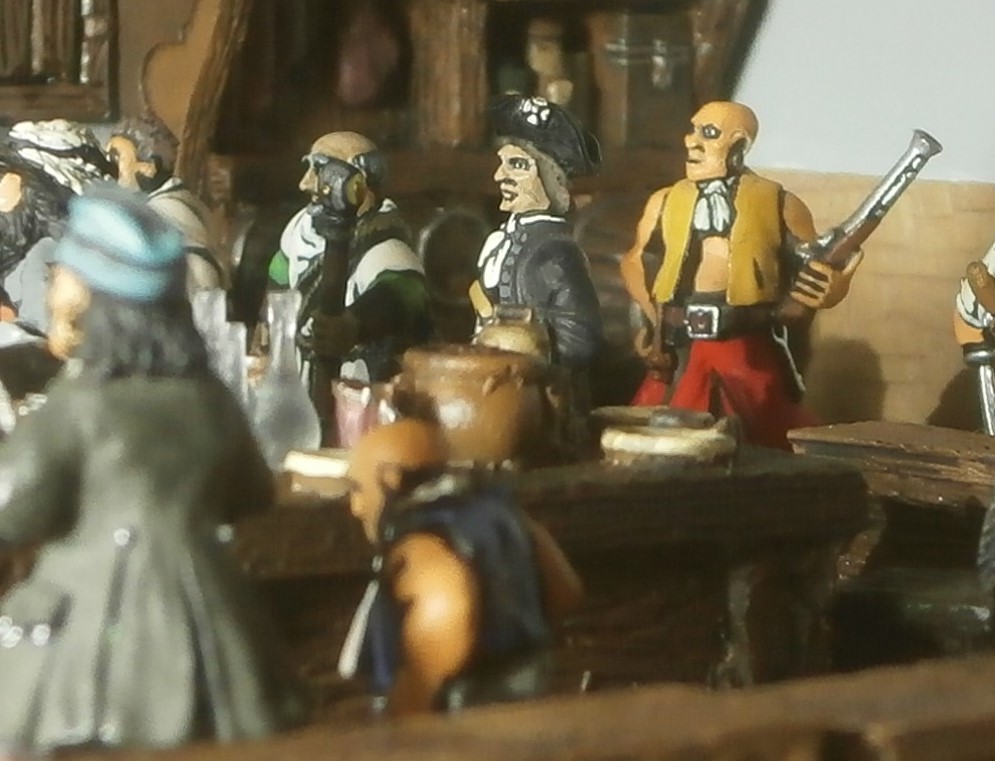
“Or the whole offer is a pretence, and he was just acting his part to make it seem real?” suggested Moukib.

“I cannot say,” admitted Hassim. “But he insisted that we accept the original offer. That, or nothing.”
“Ha!” laughed Moukib. “He should be glad we are even considering it, for the alternative is that we raze every settlement in Portomaggiore to the ground and take everything of worth from the entire realm.”
“A delightful thought, Moukib,” said the admiral. “But we have not the time to do so, knowing the duke approaches with his army.”
All turned to the admiral.
Captain Van Baas scraped his cutlass blade against his iron-hook hand (a habit he had when wanting to make his presence felt). His black beard rivalled his large, black felt hat in size, while his eyes had a stare that would, on anyone else, hint at a jug-bitten state. Not so Van Baas, however, for his face wore that stare morning, noon and night, both sobre and sotted.
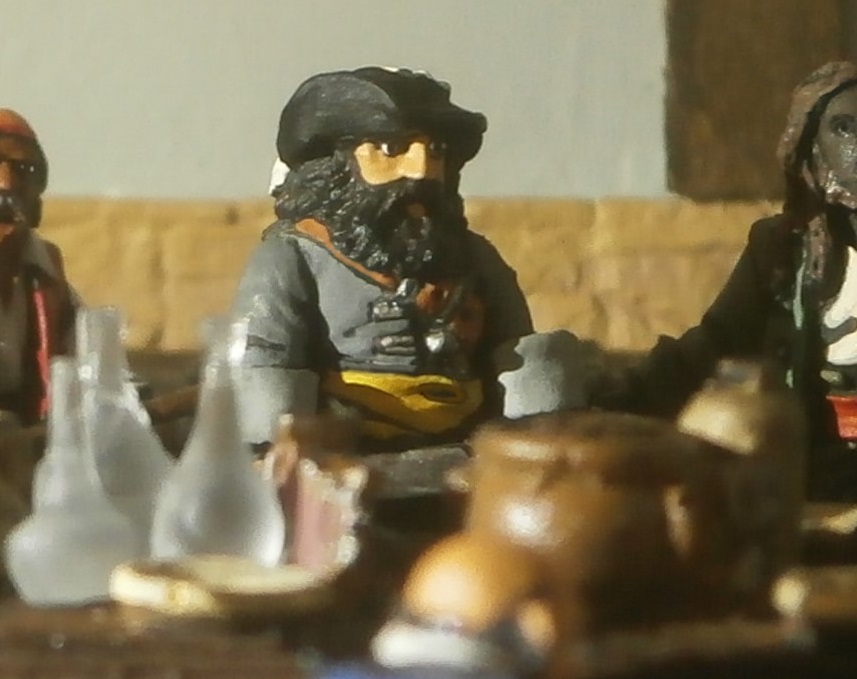
“Is he though, Admiral? Is he close?” asked the captain. “This offer proves the Portomaggiorans are weak and afraid. They know full well they cannot win a fight, not yet anyway, not without their army, and so they hope to bribe us. If their lord was close, they would trick us into staying, not leaving. Moukib is right, we should keep razing settlements while they cry their tears. That way we can take much more than they offer with this bribe.”
“Good captain, I value your counsel,” said Volker. “But before we decide our course of action, I would hear what came of the negotiations. Hassim?”

“I did not want to make it easy for him, admiral,” answered Hassim. “So I told him we must discuss the matter, yes – especially how we might explain it to you.”
The admiral chuckled, this time his momentary smile more convincing. He had ordered Hassim to accept what was offered if they could get nothing more. Hassim had however, not rushed to do so, instead playing a clever game with the city’s governor, pretending they had their orders from a man they greatly feared, and thus baulked at failing to obtain the demanded terms.
Hassim continued. “We took ourselves to a wharf-side alehouse to make it look like we were considering the offer seriously. Then, early morning, we returned and said that we agreed to the terms.”
“And Lord Nero believed you?” asked Volker.
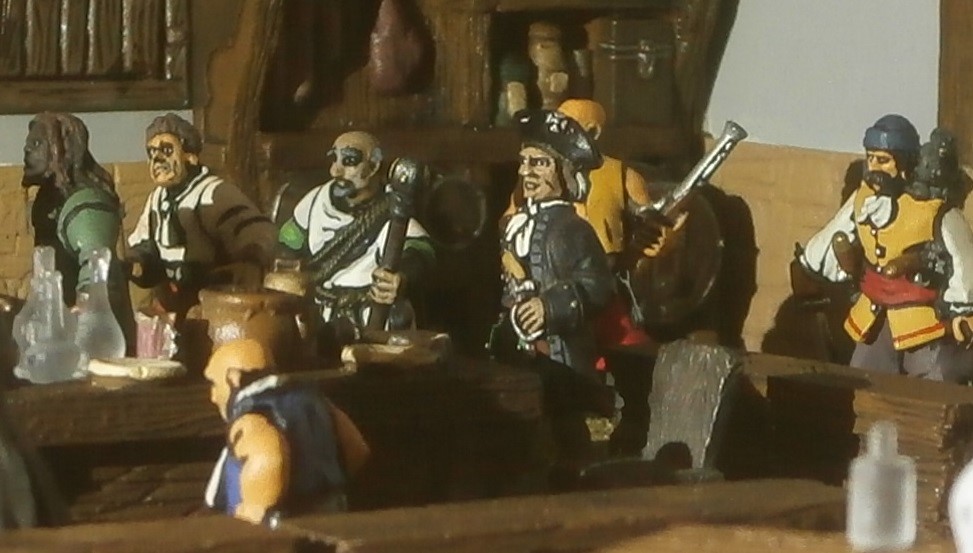
“Like you commanded, I ended by telling him that you did not relish facing Lord Alessio’s army when it returned.”
Several among the pirates turned to look quizzically at the admiral. No doubt they wondered at this declaration of weakness.
“What?” asked Volker, feigning bemusement. “Can you not see? If we act as if we fear Lord Alessio’s return, then they will more likely believe we are keen to honour the terms of this agreement, and so leave quickly. They may then drop their guard – no bad thing, whether we leave or stay.”
“Which is still to be decided,” said Captain Garique. “We never settled the matter before. We only agreed to accept the offer, not whether we would actually abide by its terms.”
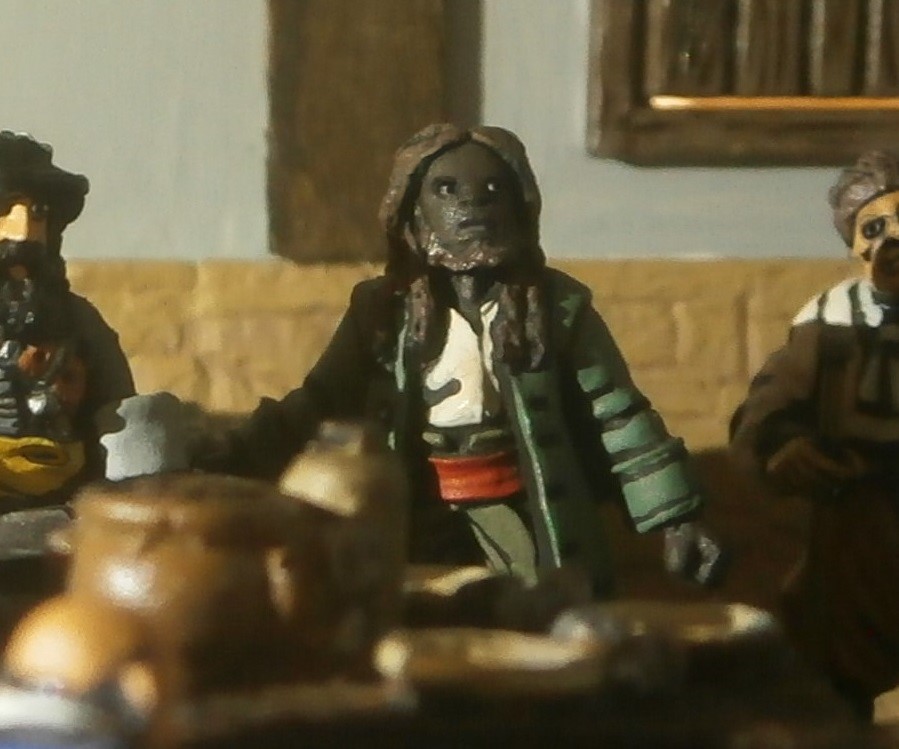
The sorcerer Adus Arcabar spoke in his quiet, almost frail voice. Whether it was magic, or something more mundane like the strange pitch of his speech, or perhaps even because many (rightfully) feared what he could do with flick of a wrist and the utterance of an arcane word or two, the room fell silent so that all could hear him.
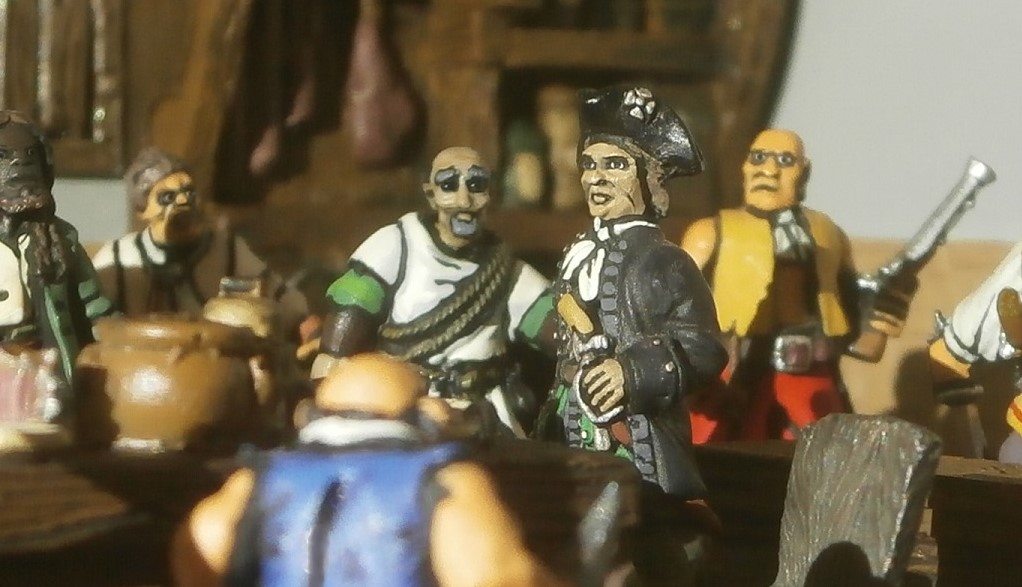
“I suspect Lord Alessio is close, just not close enough to trouble us immediately. This bribe may well be an attempt not to see us off quickly, but rather to delay us, and halt our looting, just sufficiently for the army to return, whilst also thwarting our further plundering. Two birds with one shiny stone.”
The gathered company pondered this a moment, then the admiral, as was his wont, broke the silence.
“Aye. Perhaps. But I say if we are not going to take the bribe, then we should take more than what was offered before we leave. To do otherwise is foolishness, for it would be to pursue a lesser profit. We should only accept the bribe if we cannot make more by looting.”
There was general nodding around the table.
“This is the vote, then,” said admiral Volker. “Do we accept the bribe and leave, or do we linger just long enough to take more than what is offered in that bribe?”
“Before we vote, admiral,” suggested Captain Garique, “should we not discuss whether it is safe to linger. If we tarry so long that we are caught between the garrison and Lord Alessio’s army, then we lose not only the chance of further profit, but also all we have taken thus far. If not all our lives.”
“Perhaps some of us are afraid?” asked Moukib.
Captain Garique did not even turn to look at his challenger, but instead continued to address the admiral.
“This is not cowardice, but common sense,” he said.
The admiral must have been pleased that his authority was such that a captain like Garique would ignore such a slight in order to maintain propriety in his presence.
“It is common sense,” agreed the admiral. “The only way to know how long we can tarry here in Portomaggiore, is to have eyes out watching for Duke Alessio, with legs beneath that are swift enough to warn us in time.”
Again, there was a general nodding of heads and a murmur of agreement.
“So, to cut to the quick, who will be those eyes?”
There was silence. Every pirate in the room must have known that whoever went would miss out on the plundering. That would mean receiving only their official share, after the collecting, counting and partitioning, with no chance to indulge in the pillaging of the precious little things the articles allowed each man to pocket (within reason), and those that were too expensive to call pillage but that could be hidden away before anyone noticed.
At the back, near the door, unnoticed by the rest, one fellow, Nicolaos Mustopoulos, nudged the fellow next to him, Corneel Metz. They were both Captain Kroll’s sailors, Nicolaus being from the Border Princes by birth, and Corneel from the far northern city of Marienburg. Corneel was as close to what one might call a first mate in any other crew, although the arrangements on Kroll’s ship were somewhat unique, for several many reasons, not least the need to allow passage and lodging to a brute three times the height of any man.
“What?” whispered Corneel, obviously annoyed.
Nicolaos raised his eyes and gestured towards the admiral.
“Oh, aye,” said Corneel quietly, then much louder added, “Erm!”
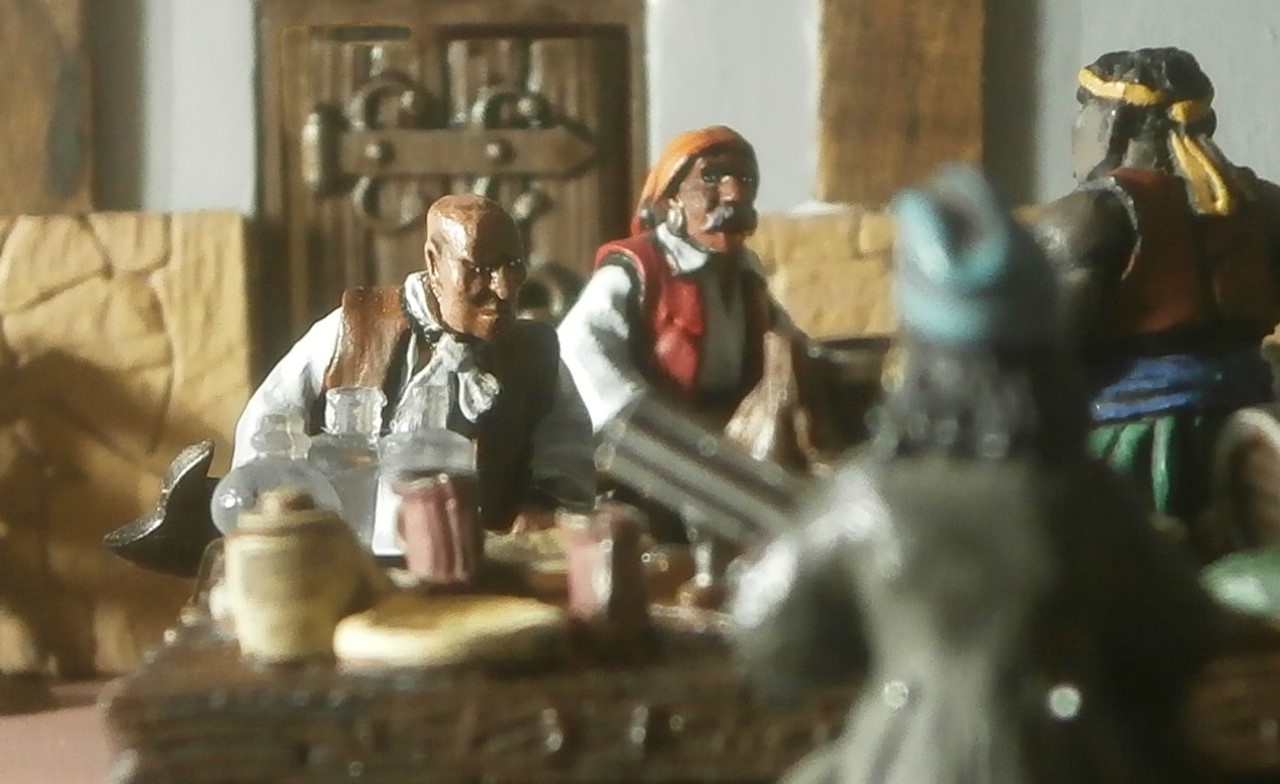
All turned to look at them, and the admiral asked, “Yes?”

“We could go,” said Corneel. “North that is. We could go keep a look out.”
“And west, in case Alessio comes that way?” queried the admiral.

“Aye, north-west, I meant to say,” agreed Corneel.
“And you speak for Kroll?” asked Moukib.
“I’m first mate, and his deputy here, so I can decide. Besides, he said we should … erm … we should make the crew useful, so that you all know we are willing to pull our weight.”
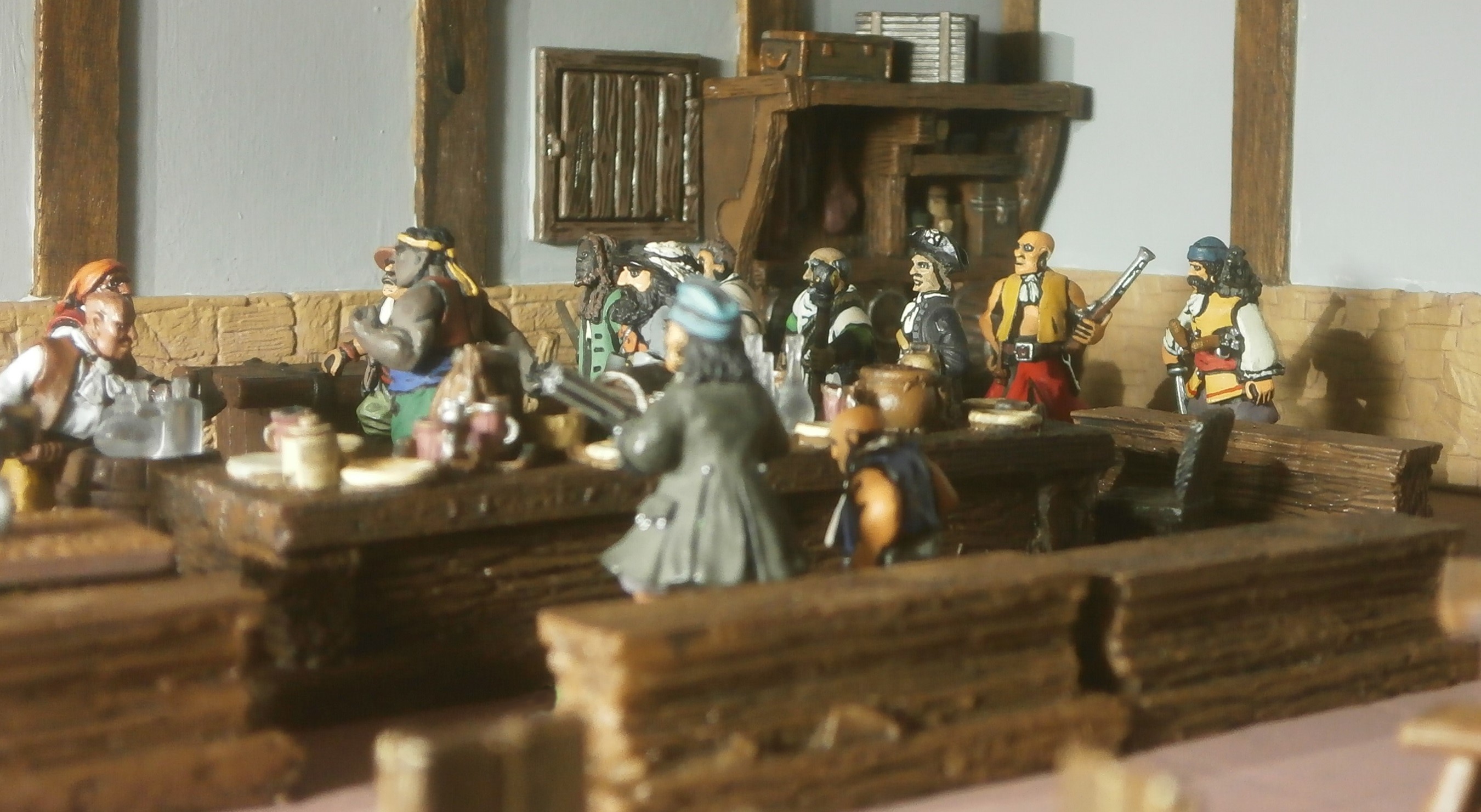
At the Battle for Eclano, Kroll and his crew had not really had much a chance to prove themselves, out on the far flank. Having bloodily dispatched a body of crossbowmen, they had then been forced by circumstance to do little more than watch as the rest of the army fought on, and Volker killed not only a dwarf lord but two brutes almost as large as Kroll!
Everyone stood watching Kroll’s men, some with relief, some with curiosity.
Corneel seemed to take this as a sign that he was required to say more.
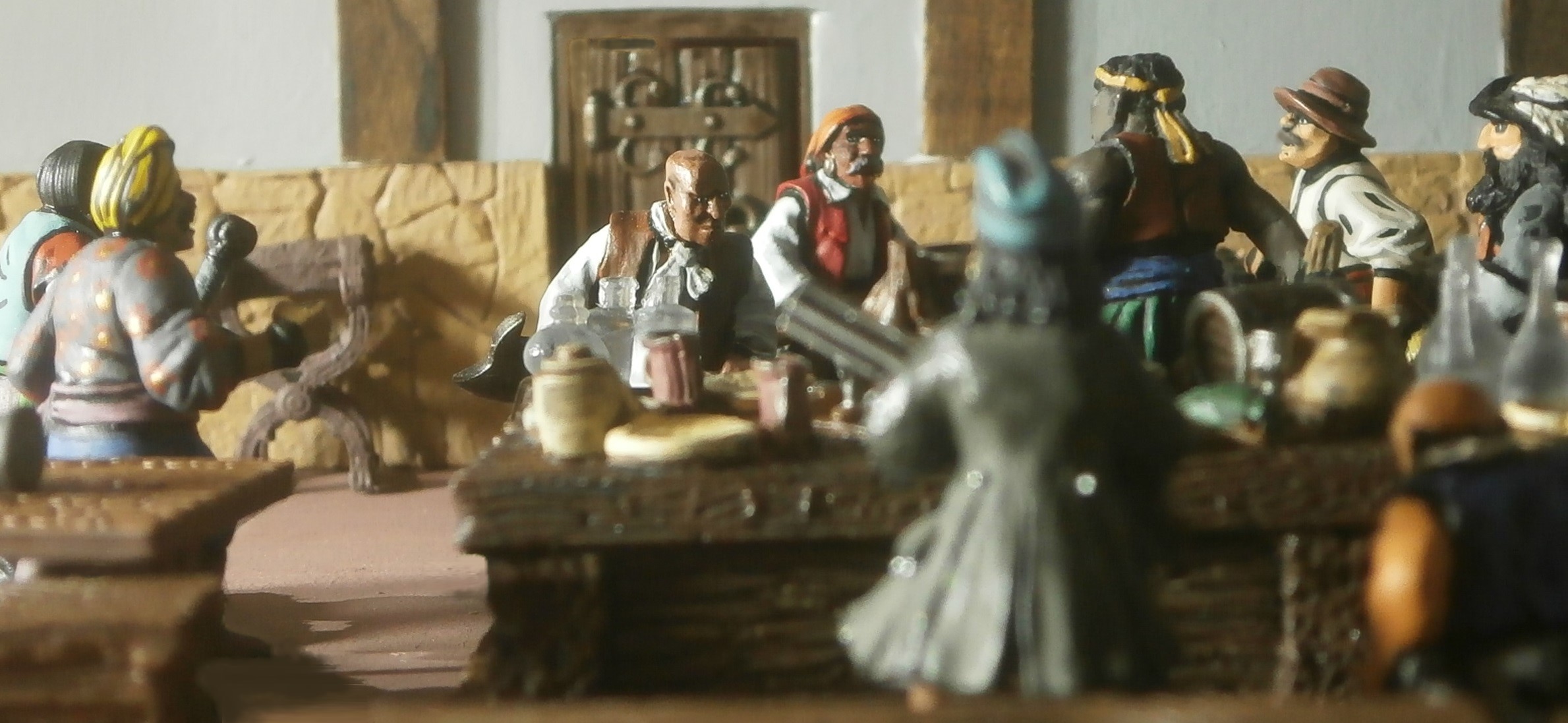
“Kroll can move faster than every man, dwarf or greenskin in the fleet. And … he’ll make sure we move fast too. Any who can’t keep up, we’ll let ‘em fall behind and die. Kroll don’t care. I don’t care. That way we can bring news of any approaching army to you quick.”
“Most helpful of you,” said the admiral, a note of suspicion in his voice.
Corneel seemed to take the hint.

“Oh, o’course the captain will expect a proper reward if he does bring warning of the enemy. Compensation for the dangers undertaken, and for missing out on the looting.”
A tension seemed to lift from the room, as if all suddenly understood.
“Aye, well,” said Admiral Volker. “I think we can all agree to that.”

There were ayes and nods about the room, which elicited smiles from both Corneel and Nicolaos, if laced with a hint of apprehension.
(Less than half an hour later.)
Captain Kroll was apparently waiting for them, which made them nervous. What if his patience had been tested?
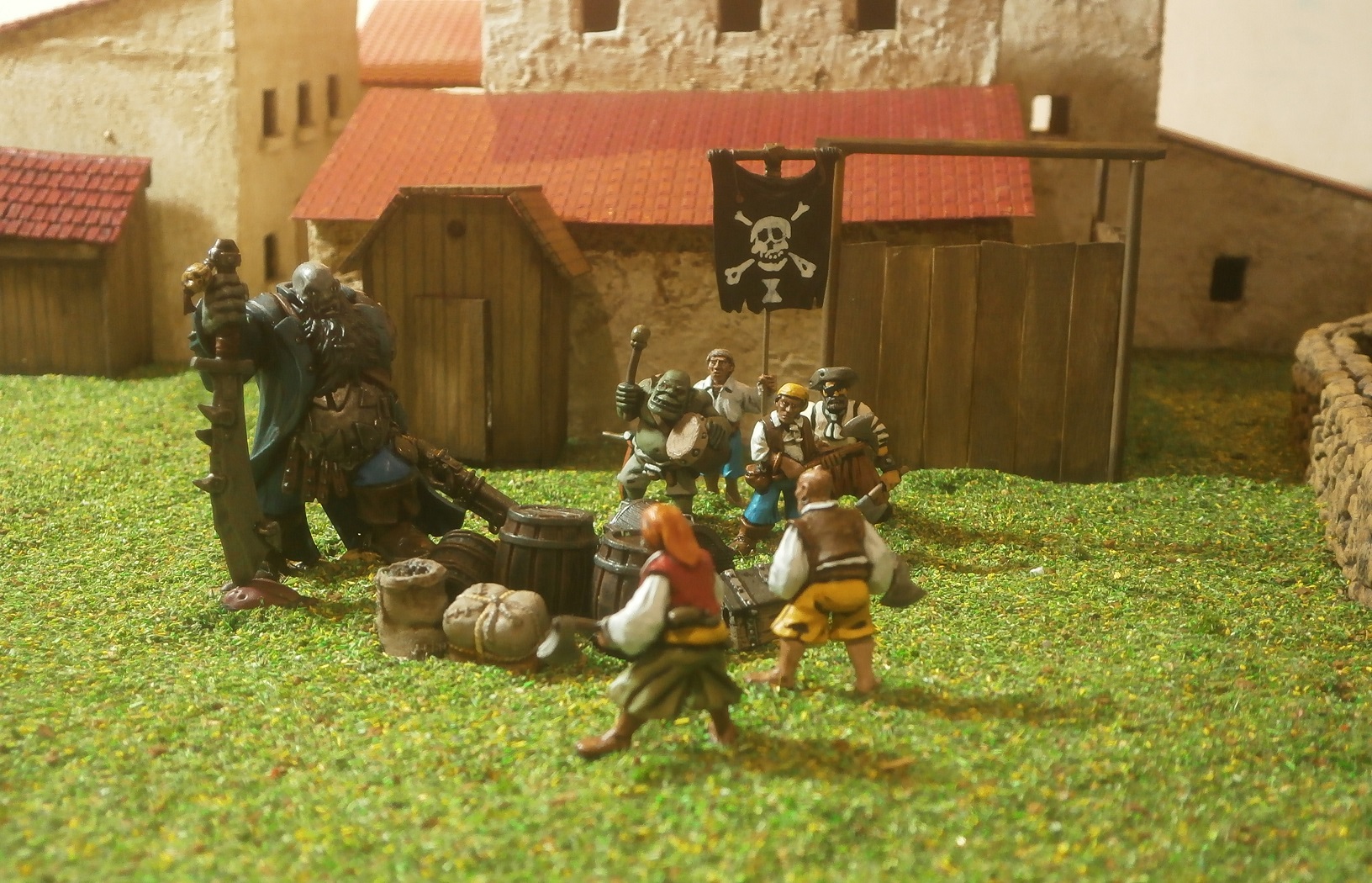
Not one for social niceties, the ogre captain didn’t greet them, but rather went straight to the question he wanted to ask.
“Did you convince him to take the army north?”
“They are going north anyway, captain, to Afragola,” answered Corneel.
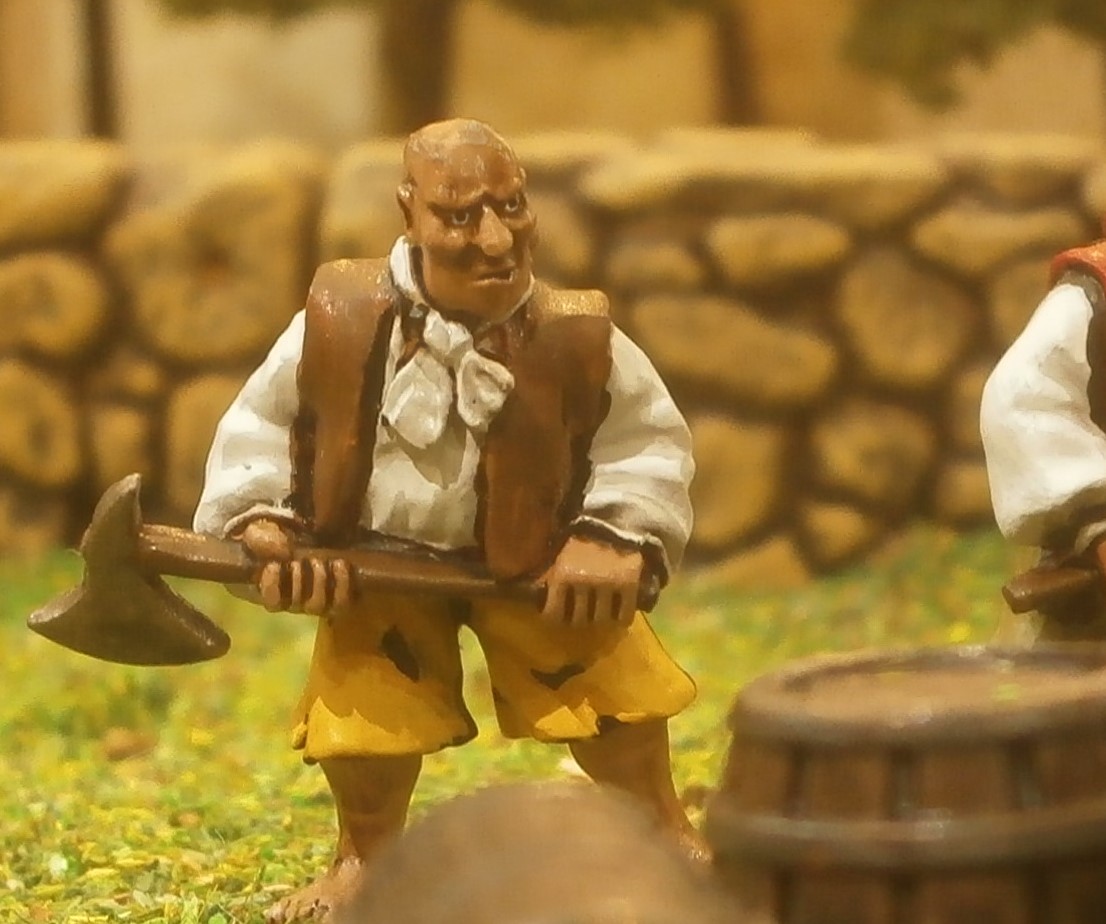
“Good. We’ll be going with them,” said Kroll.
Some of the rest of the crew were with the captain, including his standard bearer and the orcen drummer he insisted beat out commands to his men in battle, despite Kroll’s voice being just as loud if not louder.
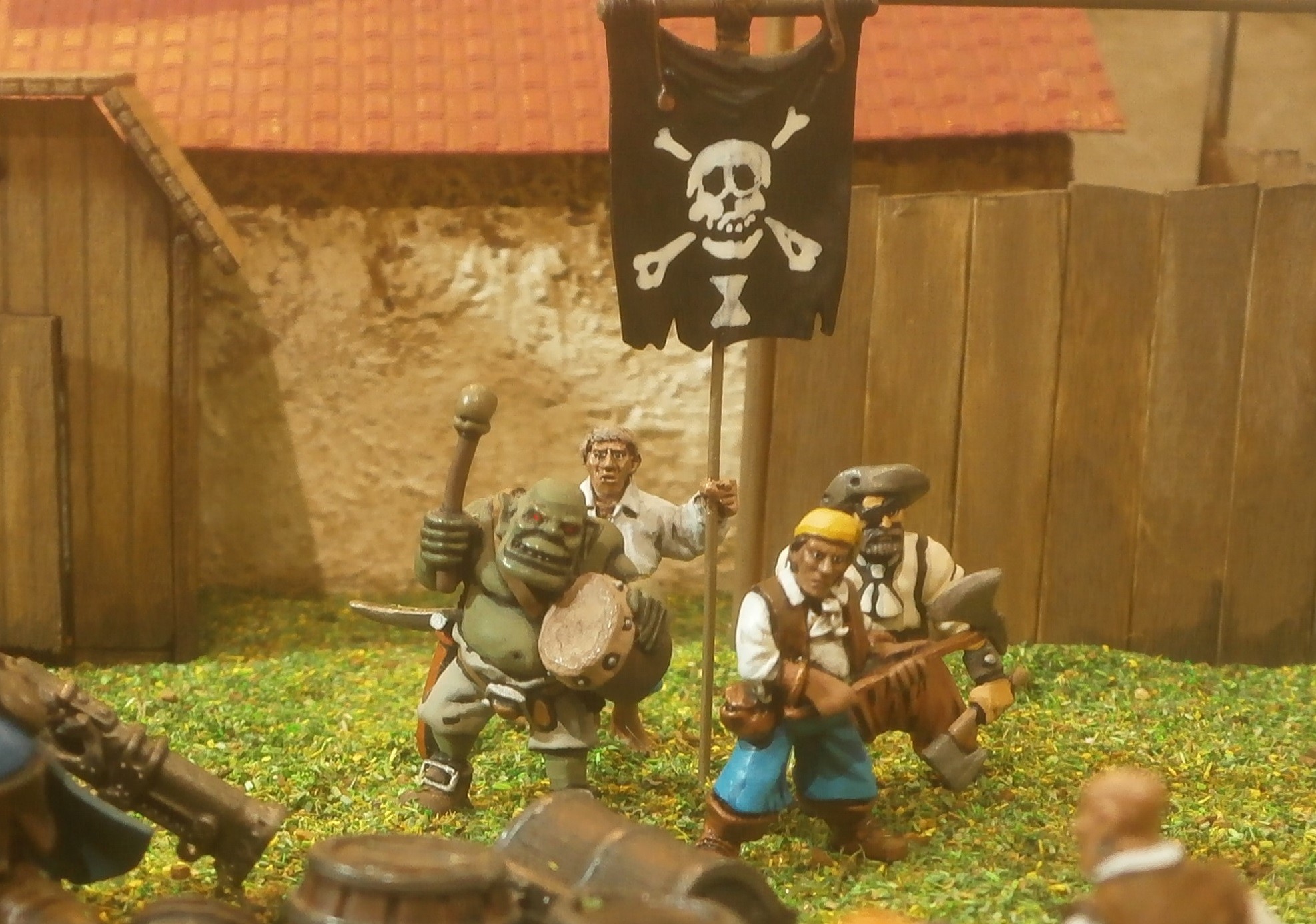
“No, captain …” began Corneel.
Kroll grimaced and fixed his so called first mate in the eye.
“Choose your next words wisely,” he growled. “I ain’t so fond of ‘No captain’!”
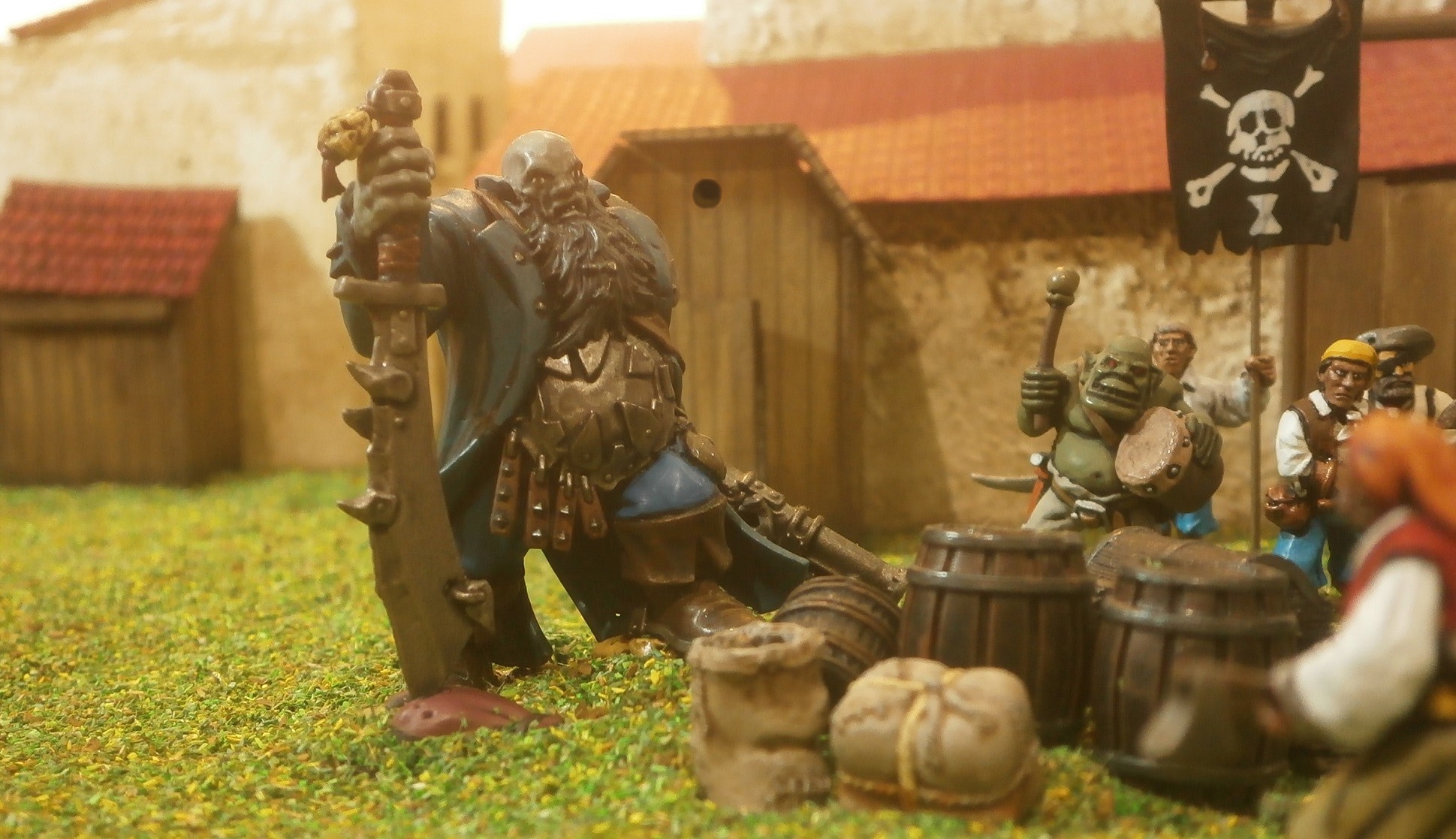
“I mean, no, better than that. He wanted volunteers to go out further – to scout for the Portomaggioran marching army.”
Kroll’s grimace changed subtly, if such is possible for an ogre.
“So you volunteered us?” said Kroll.
“That I did captain, and not a one of them there objected.”
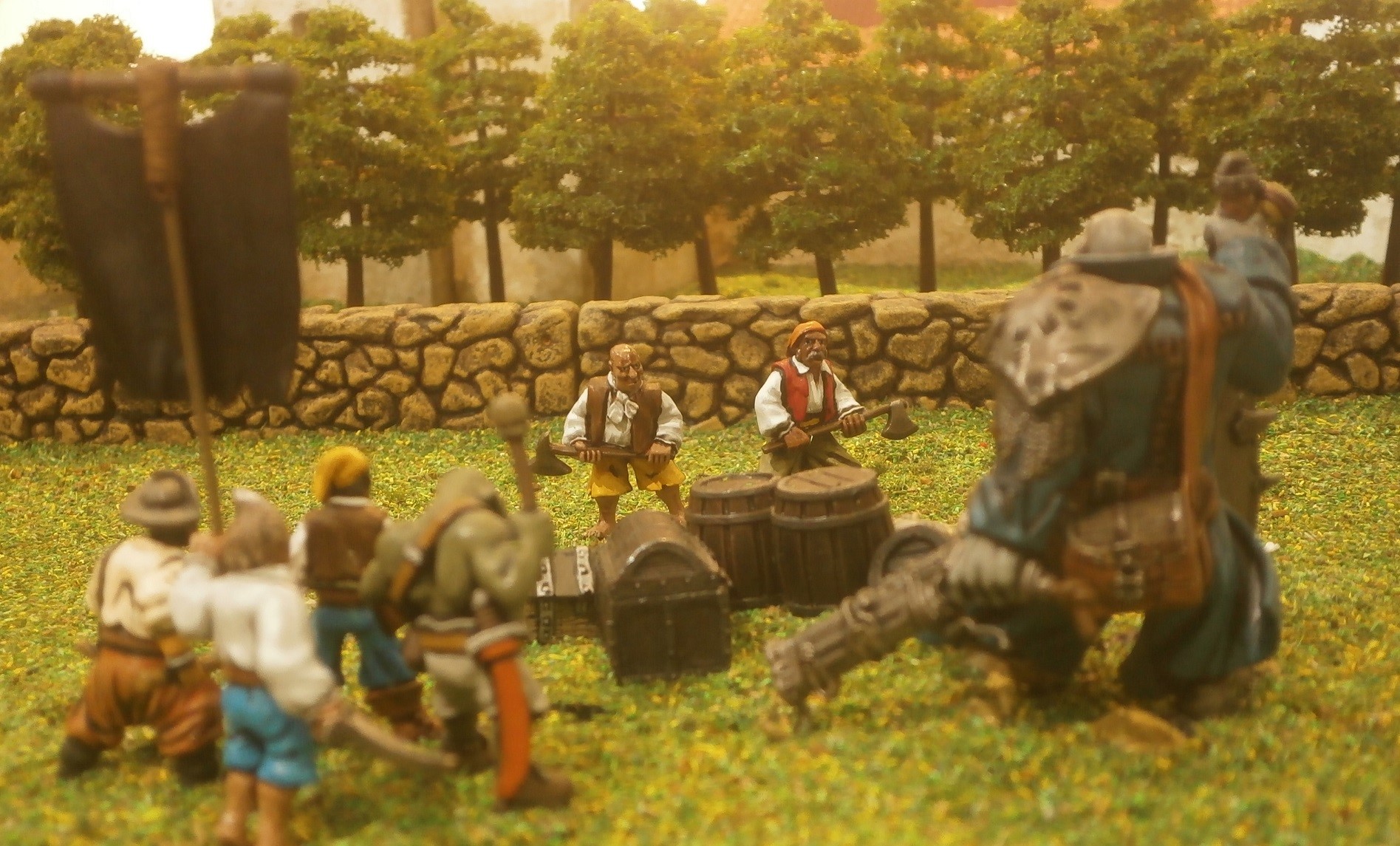
“That’s because,” offered Kroll, “they’re afeared. Afeared to go out alone to chance capture by the foe, and more afeared, no doubt, that if they went they’d miss out on all the looting.”
“You’re not wrong, captain,” said Nicolaos, finally finding the courage to join the conversation.
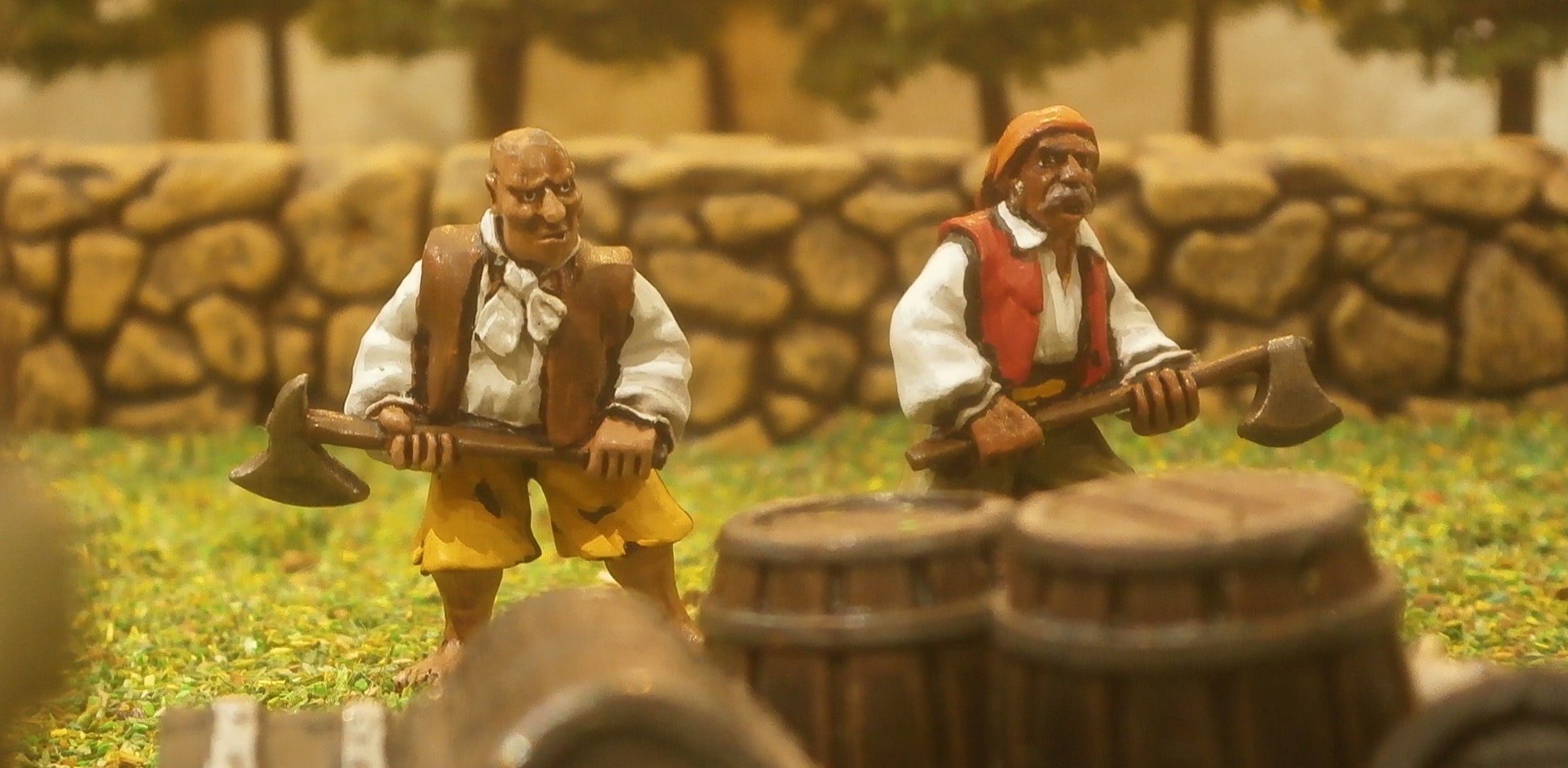
“That I ain’t, Nickle.”
Nicolaos and Corneell’s last conversation with the captain had been concerning how best to slip away from the main force, without hindrance and without their absence being noticed for some time. Now that conversation had proved to be a waste of time, for they were going to leave with the admiral’s blessing.
“Corneel,” ordered Captain Kroll, “go to the ship to tell the lads to set sail and bear north. They’re to keep close to the shore, but not so close when they pass by light house. I don’t want its lightning to strike my vessel. We’ll go on foot, the better to search, so tell ’em we’ll signal if we need ’em.”
“Aye , captain,” said Corneel, about to turn away.
“Wait,” barked Kroll. He pondered something for a moment, then continued. “When you return, bring Stulby and Skarrak back with you. And make sure no-one else sees them, especially Skarrak. They’ll be coming with us.”

Grinning broadly, he looked at the knot of men by his side, announcing,
“I hope everyone has found their land legs, ‘cos we’ve some marching to do.”